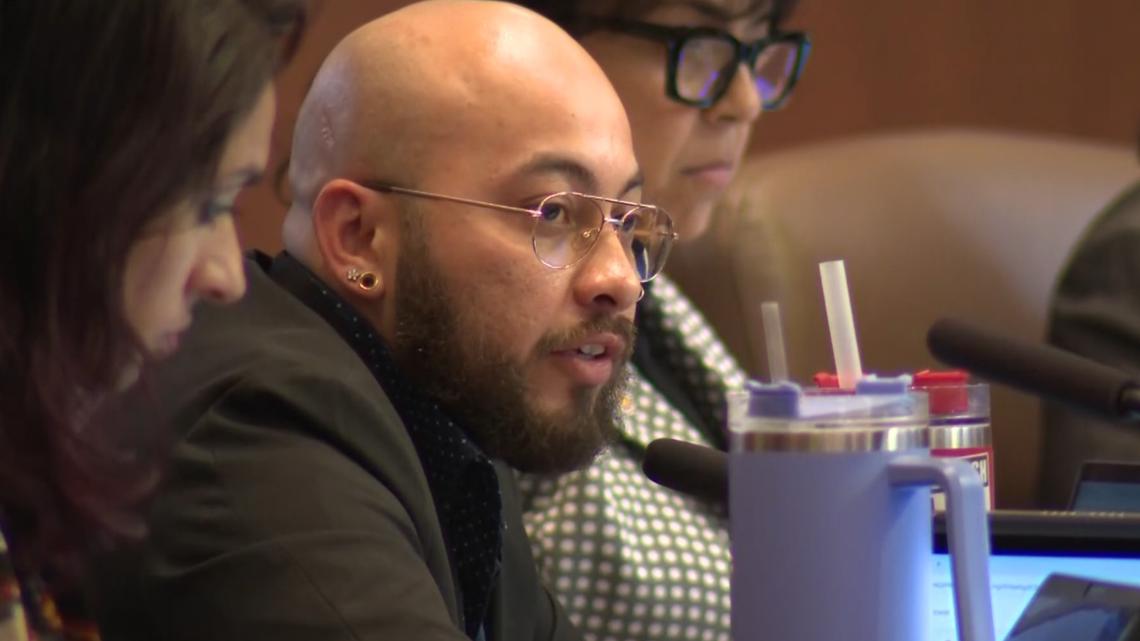
The outgoing city leader is seeking permanent investments to address homelessness and a shortage of affordable housing in San Antonio.
SAN ANTONIO — An interim San Antonio leader is using his last days in office pushing for reforms in addressing homelessness and a closer look at how the city helps provide shelter for some of its most vulnerable residents.
Leo Castillo-Anguiano has served as the interim City Council representative for District 2 since June, with Jalen McKee-Rodriguez on parental leave. In his final week of filling in – Castillo-Anguiano said Thursday marks the end of his interim appointment – he filed a request that could shift how resources are spent as the city prepares to invest $60 million into homelessness and affordable housing next year.
That number includes a $30.5 million allocation specifically to homeless services through the city’s recently approved Fiscal Year 2026 budget. That’s down about a third from the $44.2 million the city designated for homeless services in the FY 25 budget.
“This issue has gone on for so long that putting a proposal forward felt long overdue,” Castillo-Anguiano told KENS 5 in an email interview. “It is disappointing to see the lack of investment in homeless services in the FY 2026 Budget, and my hope is that this CCR will create an opportunity to make more impactful investments to support our houseless neighbors.”
According to the 2025 Point-in-Time count conducted in January – a 10-day snapshot of the homelessness challenge at the local level – 3,625 people were experiencing homelessness in San Antonio. The local unsheltered population grew by 9.7% from 2022 to 2025.
Services for the homeless community, as well as camp abatement and affordable housing, were found to be priorities for residents this summer as City Council was beginning budget deliberations.
Castillo-Anguiano’s recently filed CCR – or Council Consideration Request, which is how council members submit policy ideas for discussion and possible action – seeks to review how money can be best used to address homelessness in San Antonio through current allocations and data.
The CCR also proposes two more direct programs as permanent avenues to alleviate the city’s homelessness challenge: A “very-low-to-no-barrier” shelter for those who might be eligible for the current low-barrier shelter operated by SAMMinistries, and an initiative that provides those residents with low-to-no-barrier work opportunities in exchange for shelter or food, similar to a current program run by the City of Denver.
The policy proposal received supporting signatures from fellow council members Edward Mungia, Teri Castillo, Ric Galvan and Marina Alderete Gavito. The next step in the process is for the CCR to be heard by the Governance Committee; a date for that hasn’t been set.
Meanwhile, the city expects 13,100 affordable homes will be built, considered under construction or at least in the planning stage by the end of next year.
Though he’s exiting a leadership position at the city level, Castillo-Anguiano said he plans to keep the ideas proposed in his CCR moving forward.
“I want to be able to look back at my time in council and remember that I used every single moment to uplift voices that are often too left behind and pushed for real change for our unhoused and our LGBTQ+ neighbors.”
According to a 2020 study from the UCLA Williams Institute, LGBTQ+ adults are twice as likely as the overall population to experience homelessness in their lifetimes.
‘One paycheck away’
Castillo-Anguiano said he has firsthand knowledge of San Antonio’s homelessness challenges through his work for the nonprofit Thrive Youth Center, which prioritizes helping LGBTQ+ youth who are unhoused and needing support.
“With the recent attacks and harmful legislation targeting the trans community, the impact on those already experiencing homelessness is far greater,” he said, citing a shortage of affordable housing, a lack of treatment services for those with mental health or substance abuse issues, and improved coordination of city services as the biggest challenges.
He also advocated for thinking beyond homeless camp sweeps; the city is aiming to close, or abate, 1,300 of those encampments next fiscal year through the newly created Homeless Services & Strategy Department.
“I believe they cause more harm than good and many folks who work in this field agree with me,” Castillo-Anguiano said. “I urge our leaders to have conversations with our unhoused neighbors. You’ll come to learn that there are more ethical solutions to helping our unhoused neighbors and that encampment sweeps are not the answer.”
“We tackle homelessness by creating more affordable housing and expanding the programs that help people get housing and keep it.
The reality of homelessness hits deep for Castillo-Anguiano: He recalls when a family friend was facing housing instability when he was a teenager before his family opened up their home to help.
Now, Castillo-Anguiano said, that individual is fresh off completing their master’s.
“Not a day goes by where I don’t think about that moment,” he said. “Seeing my mom handle this issue with such compassion and love, even when we as a family didn’t have a lot to offer, and struggled every day to make it—this is what helped me realize that we are all vulnerable to being homeless and that some of us are merely one paycheck away from being homeless.”
